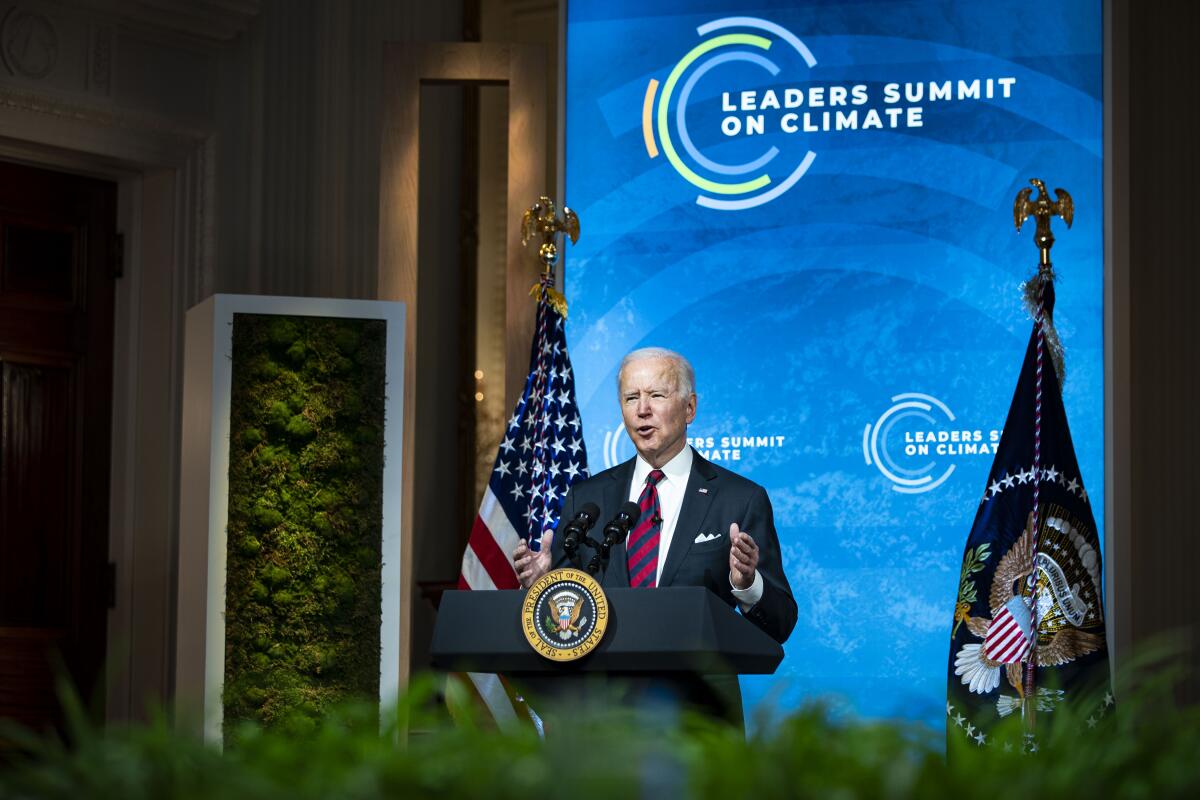Editorial: President Biden is wrong: The federal government should absolutely raise the gas tax

- Share via
How did a simple, logical and once-bipartisan policy such as the gas tax become such a political land mine that neither Democratic nor Republican presidents will touch it?
The federal taxes on gasoline and diesel fuel haven’t been increased in nearly 30 years, leaving less money over time to pay for roads, bridges and public transit improvements. But even a modest proposal to raise the tax by a few cents per gallon to help fund infrastructure investments has been batted down by President Biden.
White House Press Secretary Jen Psaki called the gas tax hike a “nonstarter” this week because it would violate Biden’s pledge not to raise taxes on Americans making less than $400,000 a year. Democratic senators have dismissed the proposal to raise the gas tax as a “Republican thing.”
These are the same leaders who have — rightly — vowed to fight climate change on every front. So why are they refusing to even consider raising the price of the fossil fuels that power cars and trucks? The transportation sector is the biggest source of greenhouse gas emissions in the United States. Political leaders’ obsession with maintaining cheap gas undermines efforts to get people into cleaner, more fuel-efficient vehicles and to cut emissions from transportation.
A gas tax increase should be considered an essential piece of any infrastructure package.
It’s true that any fuel tax hike that’s small enough to be politically feasible would raise far less than the $2 trillion needed to finance Biden’s initial proposal or even the $1 trillion required for the scaled-back version being negotiated by Democrats and Republicans in Congress. Both proposals would stretch over eight years. By contrast, raising the tax 15 cents per gallon and pegging future increases to inflation would generate about $200 billion over the same period.
Still, the higher gas tax revenue could be an important piece of the funding puzzle, along with raising taxes on corporations and high-income households, as the Biden administration has proposed, or repurposing uncommitted COVID-19 relief dollars, as Republicans have suggested. More important, though, increasing the gas tax would restore a consistent source of transportation funding that has been depleted over time.
Created in 1956, the federal Highway Trust Fund was envisioned as a user-supported system, with drivers paying taxes at the fuel pump to finance roads, highways and bridges. For decades there was bipartisan support for raising the gas tax when needed to keep up with inflation and demand. Lawmakers pitched it as a user fee to maintain the transportation system rather than a tax, and there was broad public support for the idea.
But that kind of pragmatism in taxation and governance is in short supply these days. Congress hasn’t raised the 18.4-cent-per-gallon federal gas tax or the 24.4-cent-per-gallon diesel tax since 1993, despite the ever-shrinking buying power of the Highway Trust Fund. Lawmakers have resorted to gimmicks and nonrecurring revenue to pay for the nation’s transportation system rather than raise the price of fossil fuel. (California and other states have raised their own fuel taxes in the meantime.)
While Democrats in Congress were once more supportive of raising the gas tax, they’ve sided with the Biden administration in arguing higher gas prices would hit low-income and rural drivers harder. They have a point. Yet these same folks would also benefit from infrastructure investments, including road maintenance, public transit and clean energy. It would make sense to pair an increase in the gas tax with extra federal support to help those Americans purchase alternative fuel vehicles, obtain broadband connections and take other steps to reduce their reliance on fossil fuels. That’s why the infrastructure package needs to be big, bold and climate-focused.
Prioritizing cheap gas does not help the U.S. meet its infrastructure needs or reach its climate goals.
More to Read
A cure for the common opinion
Get thought-provoking perspectives with our weekly newsletter.
You may occasionally receive promotional content from the Los Angeles Times.










